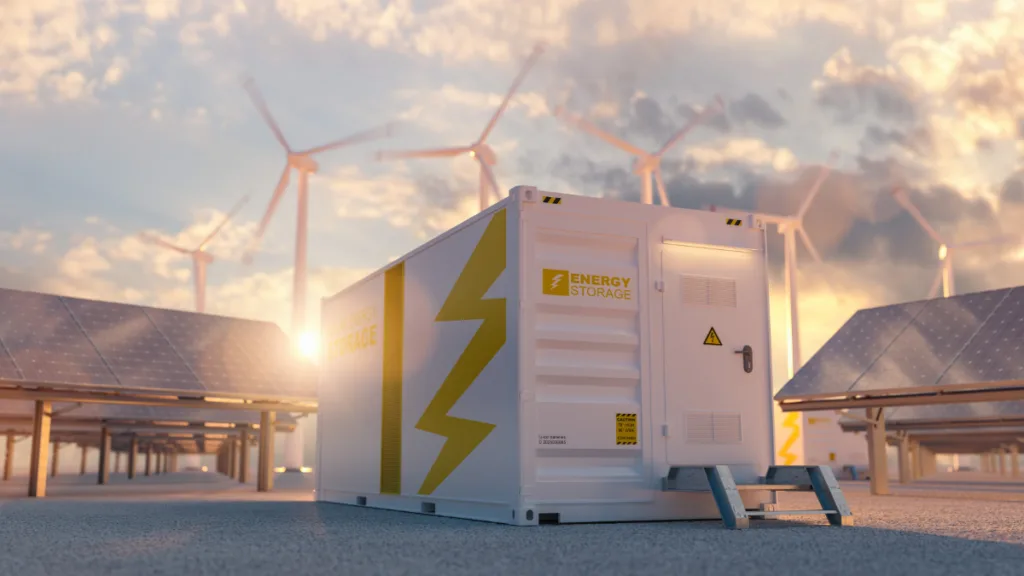
Ahmedabad, India – 18 November 2025: The Adani Group has announced its first major venture into the battery energy storage sector with the launch of a 1,126 megawatt (MW) / 3,530 megawatt-hour (MWh) Battery Energy Storage System (BESS) at its Khavda solar photovoltaic (PV) complex in Gujarat. The project, now under construction, is expected to be commissioned by March 2026 and will be India’s largest battery storage facility to date.
Positioned as a ‘flagship deployment’, the Khavda BESS will enhance grid stability through peak load management and energy time-shifting, forming a key pillar of Adani’s ambition to integrate flexible storage solutions within its renewable energy portfolio. The initiative marks a significant expansion of Adani’s clean energy infrastructure beyond generation into large-scale electricity storage.
Gautam Adani, Chairman of the Adani Group, said:
“Energy storage is the cornerstone of a renewable-powered future. With this historic project, we are not only setting global benchmarks but also reinforcing our commitment to India’s energy independence and sustainability. This initiative will enable us to deliver reliable, clean and affordable energy solutions at scale.”
Building on a Robust Renewable Foundation
Adani Green Energy Limited (AGEL), the conglomerate’s renewable arm, already operates an extensive portfolio of 15 gigawatts (GW) of solar PV, wind, and hybrid generation assets across India as of June 2025. The Khavda solar park, where the battery facility is being installed, is the centrepiece of AGEL’s renewable operations and one of the world’s largest integrated solar developments. It is being developed in phases with the aim of achieving 30GW of solar capacity within five years. The first 1GW went online in early 2024.
The addition of battery storage at Khavda will allow surplus energy generated during low-demand hours to be stored and dispatched during peak periods — a capability increasingly essential to India’s rapidly expanding renewable mix. The facility will help support grid stability, reduce reliance on fossil fuel-based balancing power, and improve the utilisation of renewable capacity across the western grid.
Scaling Up India’s Battery Storage Ambitions
Following this initial deployment, the Adani Group plans to commission 15 gigawatt-hours (GWh) of BESS capacity by March 2027 and expand this to 50GWh within five years. This acceleration mirrors the company’s long-term plans to play a major role in balancing and stabilising India’s renewable energy output, reinforcing the country’s broader target of achieving 500GW of non-fossil energy capacity by 2030.
Adani’s battery projects will operate in parallel with its pumped hydro energy storage (PHES) portfolio, another key storage technology recognised under the Central Electricity Authority’s (CEA) National Electricity Plan. In April 2025, AGEL signed a 40-year Power Purchase Agreement (PPA) with the Uttar Pradesh Power Corporation Ltd for the 1,250MW Panaura Pumped Hydro Storage Project. The company currently has four PHES developments either operational, under construction, or in advanced planning stages across India.
Industry Context and Growth Trends
India’s battery energy storage market is entering a phase of rapid expansion, driven by policy incentives, declining lithium-ion battery prices, and state-level tenders for renewable-backed storage capacity. According to industry analyses reported by Battery News India, several domestic and international developers are racing to establish early positions in the Indian BESS market, with capacity pipeline estimates exceeding 50GWh by 2030.
This strategic movement aligns with national priorities outlined by the Ministry of Power and the Bureau of Energy Efficiency. Policies such as the National Framework for Energy Storage Systems and viability gap funding schemes for large projects are intended to catalyse domestic manufacturing, lower costs, and expand private-sector participation in energy storage.
The recent Energy Storage Summit India (ESSI) in Greater Noida highlighted strong developer interest and evolving business models in the sector. Industry participants, including Adani’s peers, have observed that grid balancing services, ancillary support, and hybrid renewable-plus-storage projects are shaping the next growth phase for India’s energy transition.
(Reference: India’s energy storage outlook evolves with new business models)
National and Global Significance
The Khavda battery project is expected to set benchmarks for the design, deployment, and scalability of large-scale storage solutions across Asia. Beyond its role in India’s energy transition, it signals growing private investment in technologies that can bridge intermittent renewable generation with continuous power availability.
Once operational, the Khavda BESS will not only mitigate variability in renewable output but will also serve as a model for integrating large-scale storage with transmission systems and renewable parks. The project will operate with advanced management software designed to optimise storage dispatch and maintain grid frequency balance.
About the Adani Group
Headquartered in Ahmedabad, the Adani Group is among India’s largest diversified business conglomerates with interests spanning energy, infrastructure, logistics, ports, mining, and utilities. Its renewable energy subsidiary, Adani Green Energy Limited, is one of the world’s largest renewable power developers with a portfolio that includes utility-scale solar, wind, and hybrid plants. Through recent investments in both battery and pumped hydro storage, Adani aims to establish an integrated clean energy ecosystem in India by the end of the decade.

Leave a Reply